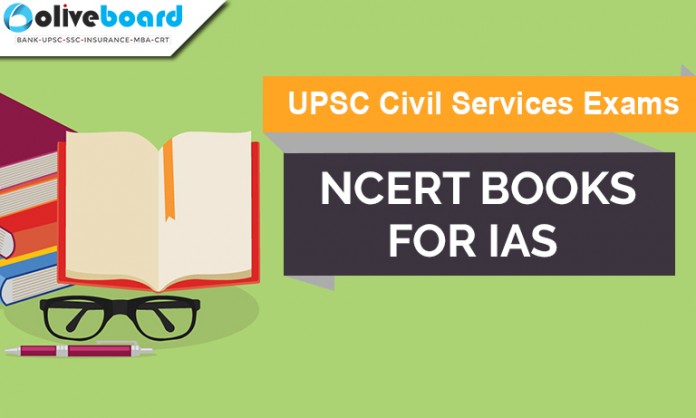It’s a common knowledge, that NCERT Books are the most widely recommended books for the preparation of UPSC Civil Services Examination. The effective reading of NCERT Books is one of the most essential part of the UPSC Civil Services Examination.
UPSC CSE aspirants are generally advised to read the NCERT Books before moving on to other bigger reference books (though there is no hard and fast rule), as they help you build a strong foundation. Thus, grasping the content of reference books becomes easier after reading NCERT Books.

Important Announcement – EasyShiksha has now started Online Internship Program “Ab India Sikhega Ghar Se”

But there are 100’s of NCERT Books and the syllabus is vast, which can be overwhelming and make you nervous. But do not panic. You do not have to read all the NCERT Books. In the following article, we are providing you guidelines on how to approach the NCERT Books and how to study selectively.
Which books to read
For UPSC CSE Prelims, it is highly recommended that you read NCERT Books from standard 6 to standard 12. It is important that you study the books topic-wise (refer the syllabus), and not chapter-wise.
Before you begin, go through the previous years’ preliminary question papers and analyse them. This should give you a brief idea about the type of questions UPSC asks under each topic and the frequency of these questions. Knowing what’s important under each topic will make your approach easier.
Following is a list of topics that broadly appear in the UPSC CSE Preliminary Examination & the respective NCERT Books you should refer:
History
Class 6: Our Past I
Class 7: Our past II
Class 8: Our past III (Part 1 and 2)
Class 9: India and the Contemporary world – I and II
Class 10: Themes in World History, India and the contemporary world II
Class 11: Themes in World History (Industrial revolution)
Class 12: Themes in Indian History I, II and III
Indian Society
Class 11: Sociology: Understanding Society
Class 12: Indian society
Art & Culture
Class 11: An Introduction to Indian Art
Class 11: Living Craft Traditions of India (Chapters 9 & 10)
Class 12: Craft Traditions of India
Geography
Class 6: The Earth: Our Habitat
Class 7: Our Environment
Class 8: Resources and Development
Class 9: Contemporary India – I
Class 10: Contemporary India – II
Class 11: Fundamentals of Physical Geography
Class 11: India – Physical Environment
Class 12: Fundamentals of Human Geography
Class 12: India – People and Economy
Top Courses in Software Engineering
Economics
Class 9 – 12
Class 9: Economics
Class 10: Understanding Economic Development
Class 11: Indian Economic Development
Class 12: Introductory Microeconomics
Class 12: Introductory Macroeconomics
Polity
Class 9 – 12
Class 9: Democratic Politics I
Class 10: Democratic Politics II
Class 11: Indian Constitution at work
Class 11: Political Theory
Class 12: Contemporary World Politics
Class 12: Politics in India since Independence
Sociology
Class 12: Social change & development in India
Science and Technology
Class 7 – 10 (All the books); Class 11 and 12 (Selective)
Class 6: The Living Organisms and their surroundings (Chapter 9)
Class 7: Weather, Climate & Adaptations of Animals (Chapter 7)
Class 7: Soil (Chapter 9)
Class 8: Crop Production & Management (Chapter 1)
Class 8: Coal & Petroleum (Chapter 5)
Class 8: Conservation of Plants and Animals (Chapter 7)
Class 8: Friction (Chapter 12)
Class 8: Pollution of Air and Water (Chapter 18)
Class 9: Natural Resources (Chapter 14)
Class 10: Sources of Energy (Chapter 14)
Class 10: Our Environment (Chapter 15)
Class 10: Management of Natural Resources (Chapter 16)
Class 12: Ecology (Unit 10)
- Chapter 13: Organisms & Population
- Chapter 14: Ecosystem
- Chapter 15: Biodiversity & Conservation
- Chapter 16: Environmental Issues
Class 11: Chemistry (Unit 14) Biology (Units 4 & 5)
Class 12: Chemistry (Unit 16) Biology (Units 8,9 and 10)
Environment and Ecology
Class 12: Biology: Last four chapters (13 to 16)
Chapters on Biotechnology
How many times to read
It is recommended that you read the above mentioned NCERT Books at least 3 times.
How to read (recommended approach)
1st Reading:
The first time you’re reading the books, read them like a novel. Highlight the important points using a highlighter (in case of eBook) or a pencil (hard copy). Keep a dictionary handy. If you come across any difficult word, look it up immediately. If you don’t understand a specific concept, use Google and read up about it.
Note on highlighting (how to know what to highlight):
It’s important that you know what information to highlight and what to ignore. This can be done by analysing the previous year question papers. Analysing previous years’ question papers will help you understand the type of questions asked under each topic. For instance, if you’re studying about the various Government schemes and policies, you should focus on advantages & disadvantages of the policy, need for that policy and its approach. If you’re studying about a specific industry, your focus should be on the location of the industry, the factors affecting its location, challenges faced, opportunities and its current situation.
2nd Reading:
Give a gap of about 2 to 3 days after your first reading, before you begin your second reading. During your 2nd reading, ignore the unwanted details and focus on the notes you had highlighted during your 1st reading. It’s a good idea to try and recall whatever you learnt during your 1st reading before revising each chapter.
Empower your team. Lead the industry
Get a subscription to a library of online courses and digital learning tools for your organization with EasyShiksha
Request NowQ. Are EasyShiksha's internships truly free?
Yes, all internships offered by EasyShiksha are completely free of charge.
Q. How can I apply for an internship with EasyShiksha?
You can apply by visiting our website, browsing available internships, and following the application instructions provided.
Q. What types of internships are available through EasyShiksha?
EasyShiksha offers a wide range of internships across technology, business, marketing, healthcare, and more. Opportunities are continuously updated.
Q. Will I receive a certificate upon completing an internship?
Yes, upon successful completion, you will receive a certificate recognizing your participation and achievements.
Q. Are EasyShiksha's internship certificates recognized by universities and employers?
Yes, the certificates are recognized by universities, colleges, and employers worldwide.
Q. Is the download of certificates free or paid?
Access to internships and courses is free, but there is a small fee to download certificates, covering administrative costs.
Q. When can I start the course?
You can choose any course and start immediately without delay.
Q. What are the course and session timings?
These are fully online courses. You can learn at any time and pace. We recommend following a routine, but it depends on your schedule.
Q. What will happen when my course is over?
After completion, you will have lifetime access to the course for future reference.
Q. Can I download the notes and study material?
Yes, you can access and download course materials and have lifetime access for future reference.
Q. What software/tools would be needed for the course?
All necessary software/tools will be shared during the training as needed.
Q. I’m unable to make a payment. What should I do?
Try using a different card or account. If the problem persists, email us at info@easyshiksha.com.
Q. Do I get the certificate in hard copy?
No, only a soft copy is provided, which can be downloaded and printed if required.
Q. The payment got deducted but shows “failed”. What to do?
Technical errors may cause this. The deducted amount will be returned to your account in 7-10 working days.
Q. Payment was successful but dashboard shows ‘Buy Now’?
Sometimes payment reflection is delayed. If it takes longer than 30 minutes, email info@easyshiksha.com with the payment screenshot.
Q. What is the refund policy?
If you face technical issues, you can request a refund. No refunds are issued once the certificate has been generated.
Q. Can I enroll in a single course?
Yes, select the course of interest, fill in the details, make payment, and start learning. You will also earn a certificate.
Q. My questions are not listed above. I need further help.
Contact us at info@easyshiksha.com for further assistance.
3rd Reading:
Now that you’re done with your second reading, it’s time to summarize what you have studied. The 3rdreading should be relatively faster than the 1st and 2nd. During the 3rd reading glance through each chapters’ highlighted parts. Try and relate the concepts you’re studying to current affairs, and connect the dots.
You can follow the above given approach or use it as a guideline to formulate your own approach and strategy for reading the NCERT Books.
About the author:
Abhishek Patil,
CEO & Co-founder at Oliveboard
Abhishek Patil is the CEO & Co-founder at Oliveboard, a leading online preparation portal for MBA, Banking and Government exams like CAT, SBI, RBI, IBPS, UPSC etc.
ALSO READ: College-students-can-now-enjoy-memorable-lifestyle-experience
Get Course: Basics-of-Cooking-Tutorial-for-Beginners





































































